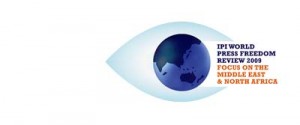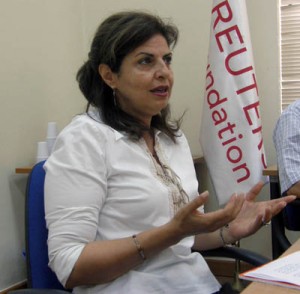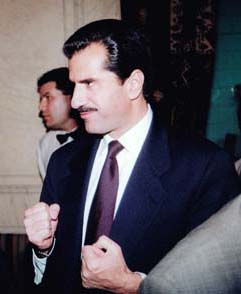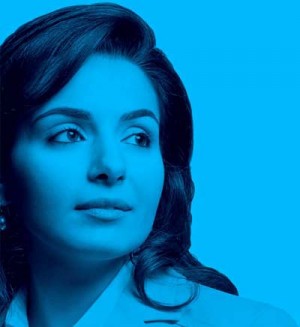By: Magda Abu-Fadil*
Press freedom is suffering in Lebanon, despite a modicum of maneuverability allowed by the law and the government’s non-interference with journalists, Information Minister Tarek Mitri claimed.
“Journalists come to complain to me about being harassed at work, even if they belong to the same party or religious sect as the media’s owners or officials,” he said of reporters, editors, anchors and others laid off in droves the last six months of 2009 some, admittedly, for their political affiliations.
 The statement and details of incidents endangering Lebanese media were published in the International World Press Freedom Review for 2009.
The statement and details of incidents endangering Lebanese media were published in the International World Press Freedom Review for 2009.
The downloadable review (http://www.freemedia.at/singleview/4765/) was produced by the Vienna-based International Press Institute (IPI) and takes aim at all manner of abuses against journalists, notably in the Middle East and North Africa region.
The report said 110 journalists were killed in 2009 because of their work – the second highest figure in the decade since 2006, when 46 of those died in Iraq.
“The freedoms that we all enjoy are indivisible, and when there are invasions of those freedoms anywhere – and that includes the developed world where corporations are sometimes at least as powerful as governments to control thought, if not always their own solvency – we must act as not only watchdog but as bloodhound in defense of those freedoms,” wrote Archbishop Desmond Tutu in the report’s foreword.
Most of Lebanon’s media outlets are unduly influenced in their journalism content by powerful political figures to whom they are financially and politically beholden, observed IPI’s Naomi Hunt.
“I love these officials’ concern with the public good as they one-up each other, as if their ministries were corruption-filled dumps before they assumed their portfolios and then turned into masterpieces when they joined the cabinet,” wrote Sanaa El Jack in Lebanon’s Arabic-language daily An-Nahar.
El Jack, a columnist for An-Nahar and editor/correspondent for the pan-Arab daily Asharq Al-Awsat, is no stranger to scathing criticism of Hezbollah and factions previously referred to as the opposition before current Prime Minister Saad Hariri formed his government of national unity, which includes them.
Shiite El Jack’s reward for her outspokenness?
 Assailants slashed her tires and poured petrol on her car’s engine in front of her home in June 2009 on a street straddling Sunni and Shiite Muslim neighborhoods where tensions have run high following urban clashes in May 2008 pitting then pro- and anti-government forces against each other.
Assailants slashed her tires and poured petrol on her car’s engine in front of her home in June 2009 on a street straddling Sunni and Shiite Muslim neighborhoods where tensions have run high following urban clashes in May 2008 pitting then pro- and anti-government forces against each other.
Unidentified assailants also pelted former legislator and journalist Bassem El Sabaa’s home with rocks that night. He is another outspoken Shiite ally of the current Sunni premier who heads the Western-backed Future Movement.
Hariri’s family owns interests in print and broadcast media, including Future TV, whose reporter Omar Harqous (http://www.huffingtonpost.com/magda-abufadil/pro-syrian-assailants-bat_b_147129.html) was battered and nearly crippled in late 2008. The station has been attacked on several occasions.
Hariri’s father Rafiq, a former prime minister, was assassinated by a car bomb in 2005 and several journalists have since been targeted by groups allied with Syria – the major power broker in Lebanon until that year – and Iran. Both countries still have active allies within Lebanese media and political ranks.
Key among those felled: senior An-Nahar columnist Samir Kassir and the paper’s publisher Gebran Tueni, both targets of car bombs in 2005.
 But condemnations of attacks on journalists by Minister Mitri, his predecessor Ghazi Aridi, the Press Syndicate, the Journalists Union, the state-run National Audiovisual Media Council, and various media-related organizations have been mostly of the lip service variety.
But condemnations of attacks on journalists by Minister Mitri, his predecessor Ghazi Aridi, the Press Syndicate, the Journalists Union, the state-run National Audiovisual Media Council, and various media-related organizations have been mostly of the lip service variety.
Class action suits are a rarity in a country where patronage is key, where journalists’ unions are run by intractable octogenarians re-elected for decades, where non-cronies are barred from union membership, where reporters are woefully underpaid and often juggle several jobs to keep afloat, where media operate along political/sectarian lines, albeit in a relatively freer environment than other Arab countries, and, where journalism is taught primarily by non-practicing ivory tower types, with professional media instructors relegated to academia’s back benches.
The Catholic observatory UCIP LIBAN tasked with defending Lebanese media against violations of their freedom and rights, has often criticized attacks on journalists.
In March 2009 it condemned an attack on TV presenter Neshan Derharoutounian by three assailants north of Beirut who broke his jaw, one of his fingers and badly bruised him. The cause remains unknown.
Long a proponent of free thought and expression, UCIPLIBAN previously identified the following constraints on news collection and dissemination:
1. Political censors – general political parameters that crimp journalists’ style and modus operandi.
2. Security apparatus’ censors – using national security as a cover to terrorize reporters.
3. Ruling regime’s censors – fear of the ruler’s fear for his fate.
4. Controlling party’s censors – pressures leading to cheerleading in the media for the ruling regime.
5. Trade union/association censors – learning how to slalom between thorny issues, to avoid taboos, and to abide by ethics codes (such as they are).
6. Self-censorship – drawing on all taboos and harmful precedents befalling colleagues to ensure one’s survival.
7. Ghost censors – inability to distinguish between what is permissible, and what is not, resulting in insipid and safe coverage.
8. Readers’ censorship – fear of losing one’s audience and a resultant cryptic writing style.
UCIPLIBAN also pinpointed these costs paid by Lebanese journalists in performing their duties:
1. Internal disciplinary actions imposed by various media and external punishments imposed by unions.
2. Fines exacted according to media laws. (Print laws were last amended in 1994, and date back to 1962. Broadcast laws were also last amended in 1994. All are out of sync with the 21st Century).
3. Moral and physical persecution of journalists seeking to uncover the truth.
4. Political persecution and prevention of journalists from exercising their political presence, the danger of covering political dissidents, and the stifling of political reporters.
5. Religious and sectarian persecution by insular communities wanting to prevent journalists other than their own ilk from knowing much about them, and resorting to professional harassment and physical or material attacks.
6. Racial and ethnic persecution barring certain journalists from covering news outside their ethnic circles.
Compounding the problem is the convergence of media and politics whereby journalists enter the political fray and become legislators. It is not considered a conflict of interest in Lebanon.
 Six journalists ran during the 2009 parliamentary elections. Three allies of Prime Minister Hariri won, including Gebran Tueni’s daughter Nayla who followed in her assassinated father’s footsteps into the family newspaper and legislature.
Six journalists ran during the 2009 parliamentary elections. Three allies of Prime Minister Hariri won, including Gebran Tueni’s daughter Nayla who followed in her assassinated father’s footsteps into the family newspaper and legislature.
The National Observatory of the Freedom of Opinion and Expression in its 2008 report claimed Lebanese journalists felt objectivity was a rarity, freedom in short supply, and harassment on the job increasing.
It also accused the media of fomenting conflicts and sedition in line with political paymasters’ desires, a charge repeatedly leveled during a highly incendiary parliamentary campaign.
* Director of Journalism Training Program at the American University of Beirut

Leave a Reply
You must be logged in to post a comment.